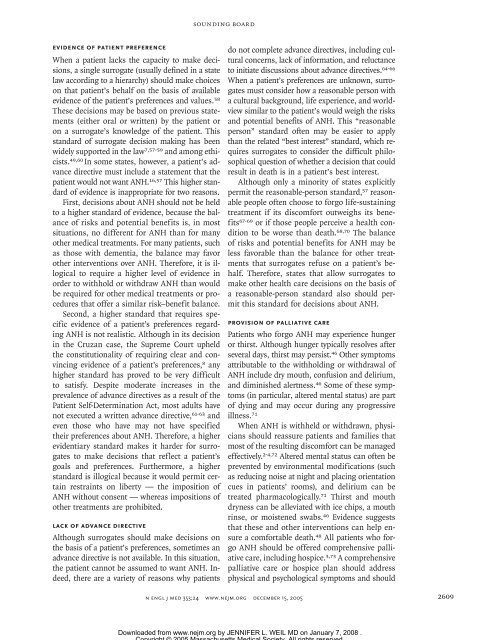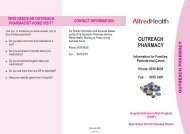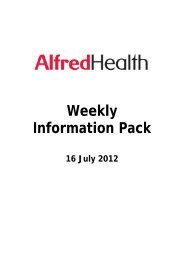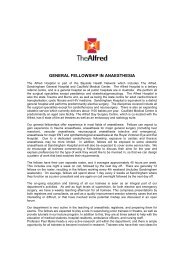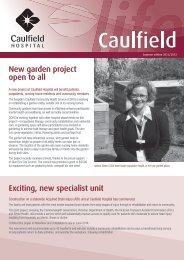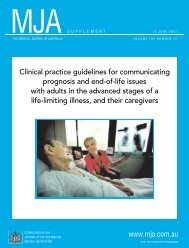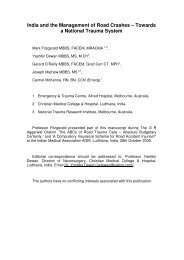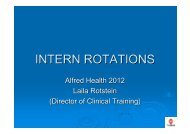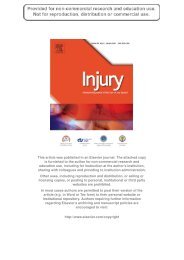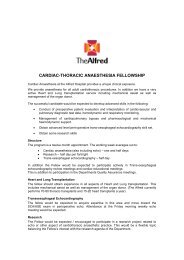Appropriate Use of Artificial Nutrition and Hydration — Fundamental ...
Appropriate Use of Artificial Nutrition and Hydration — Fundamental ...
Appropriate Use of Artificial Nutrition and Hydration — Fundamental ...
You also want an ePaper? Increase the reach of your titles
YUMPU automatically turns print PDFs into web optimized ePapers that Google loves.
sounding board<br />
evidence <strong>of</strong> patient preference<br />
When a patient lacks the capacity to make decisions,<br />
a single surrogate (usually defined in a state<br />
law according to a hierarchy) should make choices<br />
on that patient’s behalf on the basis <strong>of</strong> available<br />
evidence <strong>of</strong> the patient’s preferences <strong>and</strong> values. 58<br />
These decisions may be based on previous statements<br />
(either oral or written) by the patient or<br />
on a surrogate’s knowledge <strong>of</strong> the patient. This<br />
st<strong>and</strong>ard <strong>of</strong> surrogate decision making has been<br />
widely supported in the law 7,57-59 <strong>and</strong> among ethicists.<br />
49,60 In some states, however, a patient’s advance<br />
directive must include a statement that the<br />
patient would not want ANH. 16,57 This higher st<strong>and</strong>ard<br />
<strong>of</strong> evidence is inappropriate for two reasons.<br />
First, decisions about ANH should not be held<br />
to a higher st<strong>and</strong>ard <strong>of</strong> evidence, because the balance<br />
<strong>of</strong> risks <strong>and</strong> potential benefits is, in most<br />
situations, no different for ANH than for many<br />
other medical treatments. For many patients, such<br />
as those with dementia, the balance may favor<br />
other interventions over ANH. Therefore, it is illogical<br />
to require a higher level <strong>of</strong> evidence in<br />
order to withhold or withdraw ANH than would<br />
be required for other medical treatments or procedures<br />
that <strong>of</strong>fer a similar risk–benefit balance.<br />
Second, a higher st<strong>and</strong>ard that requires specific<br />
evidence <strong>of</strong> a patient’s preferences regarding<br />
ANH is not realistic. Although in its decision<br />
in the Cruzan case, the Supreme Court upheld<br />
the constitutionality <strong>of</strong> requiring clear <strong>and</strong> convincing<br />
evidence <strong>of</strong> a patient’s preferences, 8 any<br />
higher st<strong>and</strong>ard has proved to be very difficult<br />
to satisfy. Despite moderate increases in the<br />
prevalence <strong>of</strong> advance directives as a result <strong>of</strong> the<br />
Patient Self-Determination Act, most adults have<br />
not executed a written advance directive, 61-63 <strong>and</strong><br />
even those who have may not have specified<br />
their preferences about ANH. Therefore, a higher<br />
evidentiary st<strong>and</strong>ard makes it harder for surrogates<br />
to make decisions that reflect a patient’s<br />
goals <strong>and</strong> preferences. Furthermore, a higher<br />
st<strong>and</strong>ard is illogical because it would permit certain<br />
restraints on liberty <strong>—</strong> the imposition <strong>of</strong><br />
ANH without consent <strong>—</strong> whereas impositions <strong>of</strong><br />
other treatments are prohibited.<br />
lack <strong>of</strong> advance directive<br />
Although surrogates should make decisions on<br />
the basis <strong>of</strong> a patient’s preferences, sometimes an<br />
advance directive is not available. In this situation,<br />
the patient cannot be assumed to want ANH. Indeed,<br />
there are a variety <strong>of</strong> reasons why patients<br />
do not complete advance directives, including cultural<br />
concerns, lack <strong>of</strong> information, <strong>and</strong> reluctance<br />
to initiate discussions about advance directives. 64-66<br />
When a patient’s preferences are unknown, surrogates<br />
must consider how a reasonable person with<br />
a cultural background, life experience, <strong>and</strong> worldview<br />
similar to the patient’s would weigh the risks<br />
<strong>and</strong> potential benefits <strong>of</strong> ANH. This “reasonable<br />
person” st<strong>and</strong>ard <strong>of</strong>ten may be easier to apply<br />
than the related “best interest” st<strong>and</strong>ard, which requires<br />
surrogates to consider the difficult philosophical<br />
question <strong>of</strong> whether a decision that could<br />
result in death is in a patient’s best interest.<br />
Although only a minority <strong>of</strong> states explicitly<br />
permit the reasonable-person st<strong>and</strong>ard, 57 reasonable<br />
people <strong>of</strong>ten choose to forgo life-sustaining<br />
treatment if its discomfort outweighs its benefits<br />
67-69 or if those people perceive a health condition<br />
to be worse than death. 68,70 The balance<br />
<strong>of</strong> risks <strong>and</strong> potential benefits for ANH may be<br />
less favorable than the balance for other treatments<br />
that surrogates refuse on a patient’s behalf.<br />
Therefore, states that allow surrogates to<br />
make other health care decisions on the basis <strong>of</strong><br />
a reasonable-person st<strong>and</strong>ard also should permit<br />
this st<strong>and</strong>ard for decisions about ANH.<br />
provision <strong>of</strong> palliative care<br />
Patients who forgo ANH may experience hunger<br />
or thirst. Although hunger typically resolves after<br />
several days, thirst may persist. 46 Other symptoms<br />
attributable to the withholding or withdrawal <strong>of</strong><br />
ANH include dry mouth, confusion <strong>and</strong> delirium,<br />
<strong>and</strong> diminished alertness. 46 Some <strong>of</strong> these symptoms<br />
(in particular, altered mental status) are part<br />
<strong>of</strong> dying <strong>and</strong> may occur during any progressive<br />
illness. 71<br />
When ANH is withheld or withdrawn, physicians<br />
should reassure patients <strong>and</strong> families that<br />
most <strong>of</strong> the resulting discomfort can be managed<br />
effectively. 2-4,72 Altered mental status can <strong>of</strong>ten be<br />
prevented by environmental modifications (such<br />
as reducing noise at night <strong>and</strong> placing orientation<br />
cues in patients’ rooms), <strong>and</strong> delirium can be<br />
treated pharmacologically. 71 Thirst <strong>and</strong> mouth<br />
dryness can be alleviated with ice chips, a mouth<br />
rinse, or moistened swabs. 46 Evidence suggests<br />
that these <strong>and</strong> other interventions can help ensure<br />
a comfortable death. 48 All patients who forgo<br />
ANH should be <strong>of</strong>fered comprehensive palliative<br />
care, including hospice. 3,73 A comprehensive<br />
palliative care or hospice plan should address<br />
physical <strong>and</strong> psychological symptoms <strong>and</strong> should<br />
n engl j med 353;24 www.nejm.org december 15, 2005 2609<br />
Downloaded from www.nejm.org by JENNIFER L. WEIL MD on January 7, 2008 .<br />
Copyright © 2005 Massachusetts Medical Society. All rights reserved.


